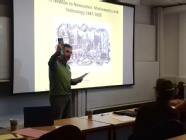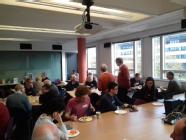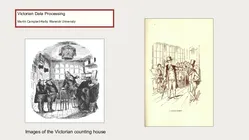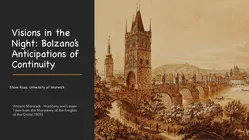Computer Science News
Warwick Postgraduate Colloquium in Computer Science 2019
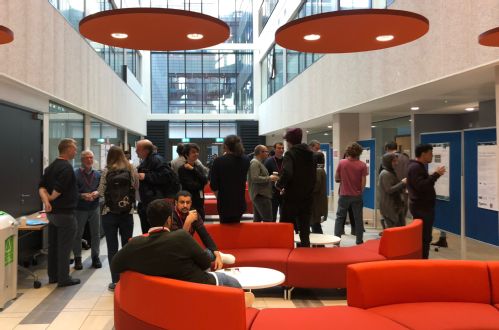
The 17th Warwick Postgraduate Colloquium in Computer Science (WPCCS) was held on Monday 9 December, in the Mathematical Science Building for the first time. This year’s event saw 78 submissions from postgraduate research students in the Department. The submissions were split across six varied tracks, highlighting the breadth and depth of research currently being conducted by PhD students within the Department.
Student presentations were supplemented with two engaging guest talks from academics in the Department. Torsten Mütze captured everyone's attention with the mathematics behind origami, and Feng Hao enlightened the audience on the encryption challenges behind e-voting. The day concluded with a festive drinks reception, sponsored by the Department’s two Centres for Doctoral Training (CDTs), at which prizes were awarded to the best posters and presentations.
PhD student attendee Jonathan Davies said, “It was very rewarding for me to present at WPCCS this year. It gave me the opportunity to share my research with others and engage in stimulating conversation with my fellow postgraduate colleagues. The guest talks, in particular, were thought-provoking and engaging. I look forward to presenting at WPCCS in the future."
Hakan Ferhatosmanoglu, Director of Postgraduate Research and CS CDT, said, “It was a pleasure to attend WPCCS this year and to celebrate the excellent work that has been undertaken by our PhD students in the past year. It was great to see how everyone was having research discussions and exchanging ideas with each other.”
Prize Winners
- Best Presentation - John Pocock
- Best Poster - Tom Wood
- Best in Computational Biology - John Pocock, Rawan Abulsayli and Hammam Alghamdi
- Best in Theory, Foundations, and Discrete Mathematics - Alex Dixon and Thesjaswini Raghavan
- Best in Computer Security and Networks - Jasmine Grosso and Shin Wan
- Best in Machine Learning and Artificial Intelligence - Tom Wood, Abeer Almowallad, Gabriele Pergola, Haoyi Wang, Junyu Li and Helen McKay
- Best in High Performance Computing and Databases - Richard Kirk and Dean Chester
- Best in Urban Science - Jonathan Davies, Teddy Cunningham, Elisa Baioni, Ivana Tosheva and Shanaka Perera
Computer Science hosts History of Mathematics
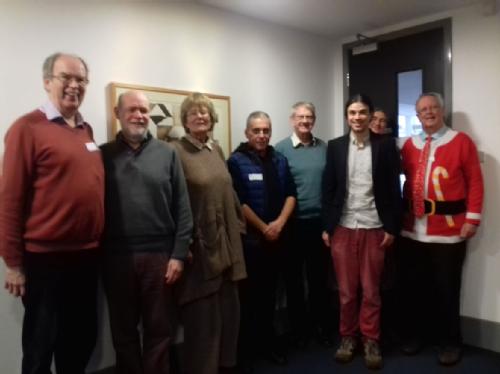
The Department of Computer Science and the Mathematics Institute jointly hosted, last Saturday 7th December, the Christmas Meeting for 2019 of the British Society for the History of Mathematics.
Our Departments have a long and strong association with the BSHM which has an established tradition of having its Christmas meeting in the Midlands. With about 50 participants, including some staff and students from both our Departments, there were 8 talks in the day ranging from figurate numbers in the 9th century, Islamic use of sexagesimal calculation for π and sine values in the 15th century, to fascinating details of Victorian data processing and the mathematical semantics of programming languages in more recent times.
There were plenty of interesting questions arising and lively discussions in the refreshment intervals. There was also a presentation of the BSHM Neumann Prize and the Society's AGM.
The day was widely acclaimed as enjoyable and successful. Our thanks are due to both Departments for their sponsorship, to the admin and technical support in Computer Science, and to the local organising work of Steve Russ and Adam Jones. Further information about the BSHM is at https://www.bshm.ac.uk/.
Full list of speakers:
- Helen Ross - Dicuil and triangular numbers
- Steve Russ - Visions in the night: Bolzano's anticipations of continuity
- Jane Wess - From Newton to Newcomen: mathematics and technology 1687-1800
- Troy Astarte - On the difficulty of describing difficult things
- Catalin Iorga - Known and unknown in Al-Kashi's mathematics
- Robin Wilson - Hunting and counting trees: the world of Cayley and Sylvester
- Chris Pritchard - From collecting coins to searching the archives: personal reflections on becoming a historian of mathematics
- Martin Campbell-Kelly - Victorian data processing
Dr Maria Liakata receives a Turing Artificial Intelligence (AI) Fellowship
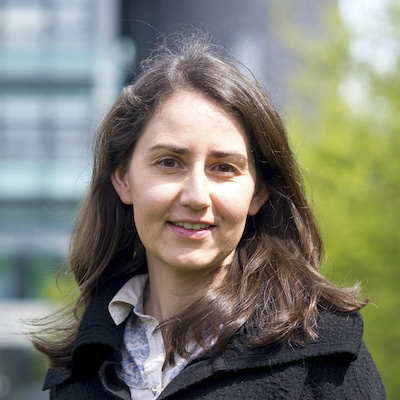
We are please to report that Dr Maria Liakata has received a Turing Artificial Intelligence (AI) Fellowship.
The Fellowships from The Alan Turing Institute, the UK’s national institute for data science and AI, aim to attract and retain exceptional researchers in artificial intelligence. Covering a broad view of AI, including applications of foundational disciplines across mathematical sciences, statistical sciences, computational sciences and engineering, Fellows collaborate across disciplines and have the opportunity to collaborate with academia, industry, government and the third sector.
Dr Liakata’s Fellowship will focus on creating time sensitive sensors from language and heterogeneous user generated content. Commenting on the research she said:
“Wide spread use of digital technology has made it possible to obtain language data (e.g., social media, SMS) as well as heterogeneous data (e.g., mobile phone use, sensors) from users over time. Such data can provide useful behavioural cues both at the level of the individual and the wider population, enabling the creation of longitudinal digital phenotypes.
“Current methods in natural language processing (NLP) are not well suited to time sensitive, sparse and missing data, collected over time or personalised models of language use. The Turing AI fellowship will allow me to establish a new area in NLP on personalised longitudinal language processing.
“I plan to develop sensors for capturing digital biomarkers from language and heterogeneous user generated content to understand the evolution of an individual over time. I want to make a significant contribution to mental health by working with clinical experts to create new tools based on the sensors, making it possible to assess and measure conditions in between clinician appointments.”
To read more on this story, please click here.
Dr Arun Prabhakar joins the department as a Research Fellow
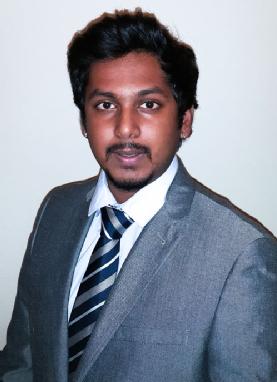
Dr. Arun Prabhakar has joined the department to work as a Research Fellow on ASiMoV (Advanced Simulation and Modelling of Virtual Systems) in partnership with Rolls-Royce and a consortium of partners, including the universities of Cambridge, Edinburgh, Oxford and Bristol. He will be working with Professor Stephen Jarvis and Dr. Gihan Mudalige.
He received his BEng (Hons) and PhD degrees in Mechanical Engineering from the University of Nottingham. He was a recipient of the prestigious Dean's Excellence PhD Scholarship from the University of Nottingham. During the course of his research career he has published several papers and also won awards for his research work.
Before joining the University of Warwick, Dr. Arun worked as Research fellow in the Gas Turbine and Transmissions Research Centre(G2TRC) which hosts the Rolls-Royce University Technology Centre in the University of Nottingham. During his time in G2TRC he has worked with a number of academics in the university and engineers from Rolls Royce in order to help them get an insight of the multi-phase and turbulent flows that arise in an aero-engine using Computational Fluid Dynamics(CFD). Applications of his research at G2TRC included modelling the complicated two phase flow in various sections of the Aero-engine such as the gearbox and bearing chambers and also associated thin film flows.
CS PhD Welcome Event
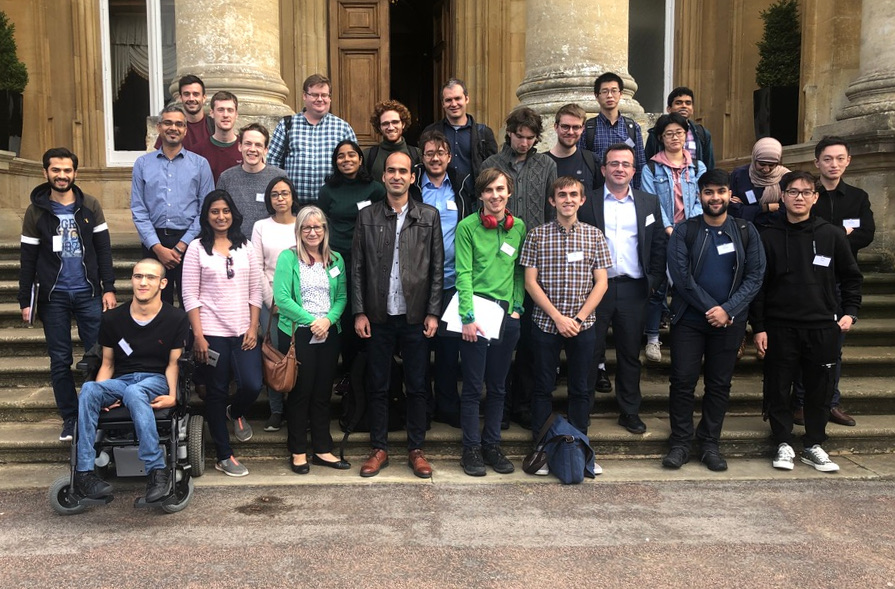
The Department organised an off-campus induction event for the new PhD students in our Centre for Doctoral Training and Research. The agenda included presentations from academics on our large research projects, alongside short tutorials on theoretical computer science and advanced machine learning. There were also informal talks about PhD life, publishing high quality work, and pursuing a research career. The event concluded with a mini data dive using air quality data from London.
The two-day welcome event was held at Heythrop Park in Oxfordshire, which offered the students and academics the opportunity to meet each other in a relaxed environment. The students also met with some of the current PhD students and asked them about their experiences. The programme was very productive with overwhelmingly positive feedback.
We welcome our new cohort of PhD students and look forward to organising similar events across the coming years.
New partnership with Samsung AI Research Centre Cambridge (SAIC)
 We are pleased to announce that the department has established a new partnership with the Samsung AI Research Centre at Cambridge (SAIC). The academic leading this collaboration, Dr Hongkai Wen, from the Artificial Intelligence and Data Science research themes, now works jointly at the University of Warwick and SAIC. The collaboration focuses on the area of efficient machine learning and on-device AI, which enables AI functions to be realised on devices themselves, without necessarily being connected to the cloud, offering more responsive, secure and privacy-preserving user experiences. It hoped that the research activities of this partnership will generate breakthroughs that can be integrated into millions of smartphones, televisions and home appliances.
We are pleased to announce that the department has established a new partnership with the Samsung AI Research Centre at Cambridge (SAIC). The academic leading this collaboration, Dr Hongkai Wen, from the Artificial Intelligence and Data Science research themes, now works jointly at the University of Warwick and SAIC. The collaboration focuses on the area of efficient machine learning and on-device AI, which enables AI functions to be realised on devices themselves, without necessarily being connected to the cloud, offering more responsive, secure and privacy-preserving user experiences. It hoped that the research activities of this partnership will generate breakthroughs that can be integrated into millions of smartphones, televisions and home appliances.
Dr. Igor Carboni Oliveira joins the Department as a new Assistant Professor
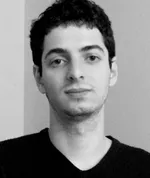 The Department is welcoming our new Assistant Professor, Dr. Igor Carboni Oliveira, who will be associated with the Division of Theory and Foundations (FoCS) and the Centre for Discrete Mathematics and its Applications (DIMAP).
The Department is welcoming our new Assistant Professor, Dr. Igor Carboni Oliveira, who will be associated with the Division of Theory and Foundations (FoCS) and the Centre for Discrete Mathematics and its Applications (DIMAP).
Before joining Warwick, Igor held postdoctoral positions at the Department of Computer Science at the University of Oxford and at the School of Mathematics at Charles University in Prague, and was a research fellow at UC Berkeley's Simons Institute for the Theory of Computing. He obtained his PhD in Computer Science from Columbia University in 2015. He is also Royal Society University Research Fellow 2019.
His research is primarily focused on the limitations of algorithms and computations, with connections to combinatorics and mathematical logic. For more information about his work and interests, please see his web page at https://www.dcs.warwick.ac.uk/~igorcarb/

